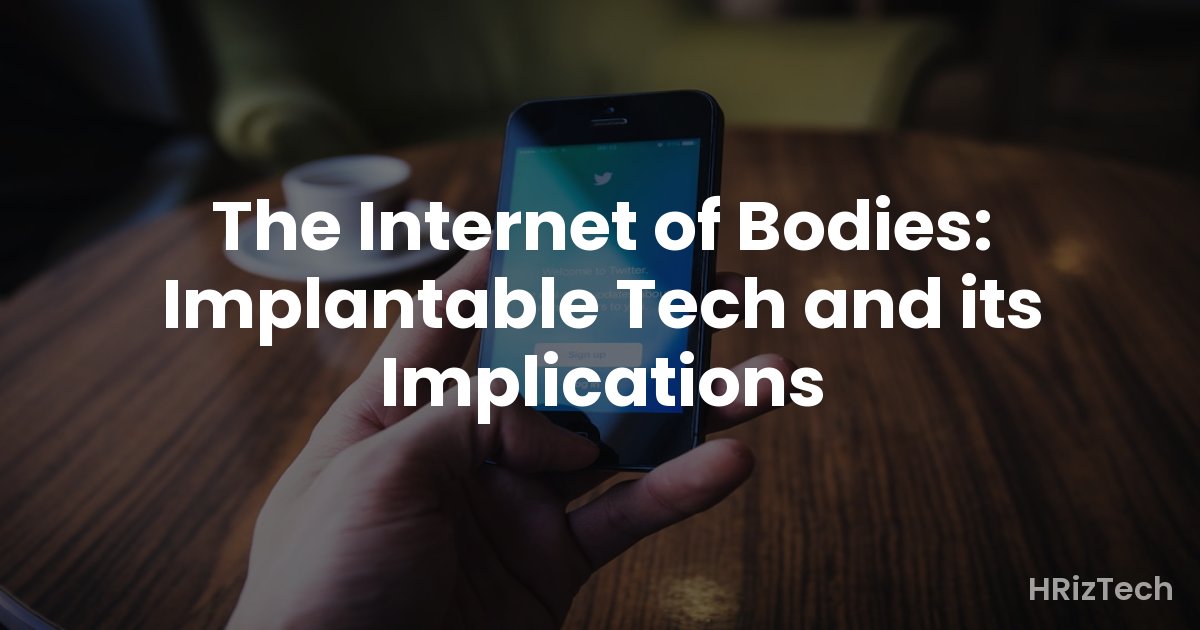The Internet of Bodies: Implantable Tech and its Implications

The Internet of Bodies: Implantable Tech and its Implications
- Implantable technology is rapidly advancing, blurring the lines between humans and machines.
- This technology offers incredible potential benefits in healthcare and beyond.
- Ethical considerations and potential risks must be carefully addressed.
- Data privacy and security are paramount concerns.
- The future of implantable tech is bright, but responsible development is crucial.
What is the Internet of Bodies (IoB)?
Forget the Internet of Things (IoT); we're diving into the Internet of Bodies (IoB), a rapidly emerging field that integrates implantable technology directly into the human body. This isn't science fiction – it's happening now. We're talking about devices ranging from sophisticated pacemakers and insulin pumps to experimental neural implants and even bio-integrated sensors that monitor everything from vital signs to brain activity. This technology promises a revolution in healthcare, offering personalized medicine, improved diagnostics, and enhanced treatment options.
The Current State of Implantable Technology
Medical Marvels:
Many of us already interact with IoB technology without realizing it. Pacemakers, for example, are life-saving devices that regulate heartbeats. Similarly, insulin pumps manage blood sugar levels for people with diabetes. These are established technologies, but their capabilities are constantly expanding. New generations of these devices offer improved accuracy, longer battery life, and remote monitoring capabilities, enabling doctors to track patients' health remotely and intervene when necessary. Cochlear implants restore hearing, while deep brain stimulators help manage conditions like Parkinson's disease.
Beyond Healthcare:
The applications of IoB extend far beyond healthcare. Researchers are exploring the use of implantable devices for enhanced human capabilities. Imagine implants that enhance strength, improve cognitive function, or even allow direct brain-computer interfaces. While still largely in the experimental phase, these advancements raise exciting possibilities, but also significant ethical questions.
The Ethical Landscape of Implantable Technology
The rapid advancement of IoB technology necessitates careful consideration of its ethical implications. The potential for misuse, data breaches, and unforeseen consequences is substantial. Several key ethical issues need addressing:
Data Privacy and Security:
Implantable devices collect vast amounts of sensitive personal data, including real-time physiological information. Protecting this data from unauthorized access and ensuring its confidentiality is paramount. Robust security measures are crucial to prevent data breaches and misuse, and strict regulations governing data storage and usage are necessary.
Informed Consent and Autonomy:
Individuals must be fully informed about the risks and benefits of implantable technology before consenting to its use. This is especially crucial for experimental devices where the long-term effects may not be fully understood. Patients must retain autonomy over their own bodies and data, with the right to opt out or remove devices at any time.
Accessibility and Equity:
The high cost of implantable technology poses a significant barrier to access for many individuals. Efforts must be made to ensure equitable access to this life-changing technology, regardless of socioeconomic status. This requires innovative financing models and public policies that prioritize affordability and accessibility.
Bias and Discrimination:
There's a risk that implantable technology could exacerbate existing biases and inequalities. Algorithmic bias in data analysis could lead to discriminatory outcomes, particularly in healthcare settings. Careful attention must be paid to ensure fairness and prevent the perpetuation of systemic biases.
The Future of the Internet of Bodies
The future of IoB is likely to be marked by further miniaturization, improved integration with the body, and enhanced capabilities. We can anticipate more sophisticated sensors, smarter algorithms, and more seamless integration with other technologies. This could lead to breakthroughs in personalized medicine, allowing doctors to tailor treatments to individual patients based on real-time physiological data. It could also revolutionize how we interact with technology, blurring the lines between humans and machines.
However, responsible development is crucial. We must prioritize ethical considerations, data privacy, and equitable access to ensure that the benefits of IoB are shared widely and its risks are minimized. The potential is immense, but we must proceed cautiously and thoughtfully.
Key Takeaways
- Implantable technology is rapidly advancing with applications in healthcare and beyond.
- Ethical considerations, including data privacy and equitable access, must be addressed.
- The future of IoB is promising but requires responsible development and regulation.
What are your thoughts on the ethical implications of the Internet of Bodies? Share your opinions in the comments below!
Comments
No comments yet. Be the first to comment!